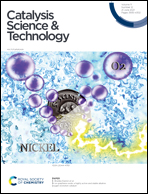On the support dependency of the CO2 methanation – decoupling size and support effects†
Abstract
The influence of the support basicity, according to the Lewis and Brønsted definition, was investigated for the Ru catalyzed CO2 methanation in the temperature range from 200 °C to 400 °C. Due to the structure-sensitivity of the reaction, a novel building block approach was used to ensure a constant Ru particle size, while varying the support material. In this way, differences in the catalytic behaviour could be directly related to support effects. Eight oxides – the rare earth metal oxides Gd2O3, Sm2O3 and Y2O3 (REOs) as well as TiO2, ZrO2, Al2O3, MgO and SiO2 as a non-basic oxide – were chosen to cover different types and combinations of basic surface sites on the support, such as Brønsted basic hydroxyl groups, Lewis basic oxygen atoms and oxygen vacancies. Above 310 °C, the REO supported catalysts showed the highest methane formation rates. The consumption of carbonate species formed upon CO2 adsorption on all three types of basic sites indicated their catalytic involvement in the high temperature regime. Below 310 °C, TiO2 and – to a lesser extent – ZrO2 excelled the other supports. For ZrO2 the enhanced performance could be related to the sole presence of Lewis basic oxygen vacancies, acting as additional CO2 adsorption and activation sites on the support. On contrary, in case of TiO2 they seemed not to be directly but only indirectly involved by facilitating the conversion on the Ru particles on the basis of a favourable electronic metal–support interaction. The inferior catalytic results obtained with the other supports were in accord with the absence of basic sites or a spectator role of the carbonates formed – except for Al2O3 which stood out probably due to Brønsted basic OH-groups formed under reaction conditions. Overall, the study reveals that basic supports can noticeably contribute to the catalytic turnover by opening new support-related pathways in addition to the Ru-related pathway evidenced in all cases and/or by promoting the latter. Their impact is dependent on the type, density and strength of basic sites available and varies with temperature.



 Please wait while we load your content...
Please wait while we load your content...